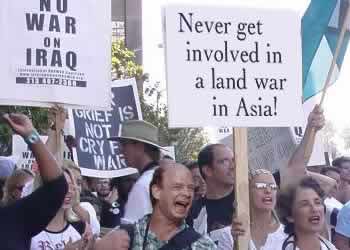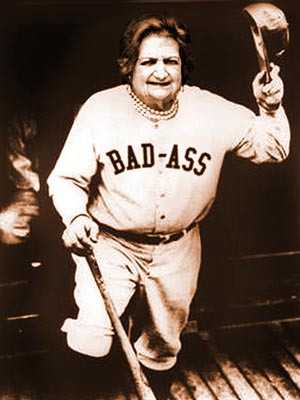Michael Lind presents
a concise argument for why the Bush foreign policy is as bad in its conception as it has been in its implementation. He breaks it down into three parts.
Global Hegemony:
As a vision for American national security, global hegemony is profoundly flawed. According to theorists of hegemony like Paul Wolfowitz, the U.S. should indefinitely dominate Europe and East Asia, in order to prevent Germany, Japan, France, and other allies from developing the capability to defend themselves independently of the U.S. This policy naively assumes that America’s former Cold War allies will indefinitely tolerate the use of their countries as launching-pads for actions in the Middle East and elsewhere of which they disapprove. Equally naïve is the assumption that other major countries will defer to the U.S. in security matters-as the opposition of every significant great power except Britain to America’s Iraq policy has now proven.
This is where the Bushy rhetoric of humility and the arrogance of their actually policies most profoundly clash. Bush likes to talk about working with our allies. But in point of fact this administration acts kindly only towards those who agree with them and smears as appeasers and dilettantes anyone who expresses reservations. And even those that side with them often get screwed in the long run anyway (see Rummy's dismissive comments about the possibility that Britain might have to pull back its support).
Some might think that this is simply a matter of them not understanding how much these actions might offend our allies. They certainly appear clueless at times. But the fact that Bush talked as if he
did care about the feelings of our allies suggests to me that at least some of them DO understand that their policies will piss people off. They just needed to fool them long enough so that they could get to the point where it was to late to stop them.
Preventative War:
It is not clear whether the Bush administration regards preventive war as a prerogative of the United States alone, or as a newly recognized right of all countries. If the former is the case, then the U.S. is claiming that it is exempt from the rules that govern other nations. If the latter is the case, then Pakistan could wage a preventive war against India today, on the grounds that India might be a greater threat in a decade or two. The distinction between wars of defense and aggression would collapse entirely, if the United States, alone or along with all other nations, had the right to wage war on the basis of speculative future threats. And it is deeply troubling that the Bush administration has now adopted, as its own strategy, a “Pearl Harbor” strategy for which Japanese war criminals were hanged by the U.S. after World War II.
I seem to recall a story that the German's infiltrated the Polish border just prior to the Sept. 1st attacks and staged a fake attack on Germany by German soldiers dressed up in Polish uniforms. I don't know whether this is true, but it wouldn't be the first time an aggressor has used the excuse that the other side was about to attack them so they
had to defend themselves. The Bush policy is different only in that he is extending the concept of how far in advance you can start worrying about the potential aggression of another nation.
Also, keep in mind that Iraq's excuse for invading Kuwait was that Kuwait was attacking their economic infrastructure by tapping into oil fields under Iraqi soil. By that logic, the invasion of Kuwait was a preventative war.
The Pearl Harbor analogy is a good one. I've been thinking of making a sign for protests that read, "Pearl Harbor was a preventative attack".
It's another sign of the arrogance of this administration that they don't factor in the consequences of other nations adopting the same policy. I guess this is to be expected considering that they came to power because of a non-precedent setting Supreme Court decision.
The rules are different when you last name is Bush.
The War On Terror:
In addition to lumping together a variety of anti-American states with different goals and capabilities, the Bush administration has used the trite phrase “the war on terror” to obscure the differences between al-Qaeda, a transnational Muslim terrorist group with members from many nations that targets the United States and Western European countries, and Hamas and Hezbollah, militant groups targeting Israel. If Hamas and Hezbollah are treated as America’s enemies, even though their quarrel is not with the United States, why aren’t the Irish Republican Army (IRA), Basque terrorists in Spain, Chechen terrorists in Russia and Tamil terrorists in Sri Lanka part of America’s “war on terror,” too?
"The War On Terror" is the modern equivalent of the perpetual war. It can never be won, so, in effect, we will always be on a war footing. This has the added benefit of giving the authoritarians the excuse they need to crack down on their opponents. How many times have we heard that, in times of war, we have to sacrifice certain liberties.
The strategic fallacies of the Bush administration need to be replaced by strategic common sense. The United States can begin to recover from the self-inflicted disaster of the Bush administration by replacing the misguided policies of hegemony and preventive war, and ill-conceived rhetoric about the “war on terror” with sound policies based on sober analysis of America’s national interest.
It's not going to happen as long as Bush is in charge. Doing this would require him admitting that he was wrong and that is the one thing Bush will
never do.
It's inconceivable!
The best we can hope for is to put enough roadblocks in their way that we can minimize the damage they inflict and reduce the amount of work that will be needed to repair the system after Dubya is gone.


 Members of the Basra Model Airplane Club demonstrate their latest developments in airborne toxin delivery technology.
Members of the Basra Model Airplane Club demonstrate their latest developments in airborne toxin delivery technology.







